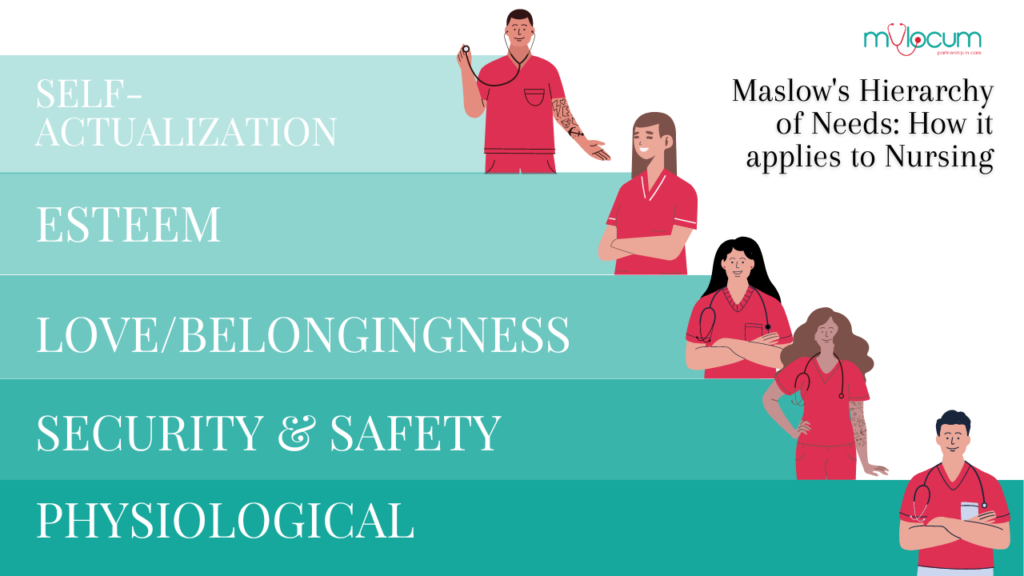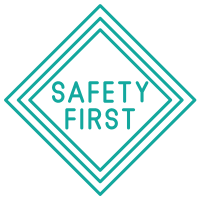
This article will go over Maslow’s Hierarchy of Needs and how it relates to nursing. Do you understand the 5 levels of nursing communication?
Not familiar with Maslow’s Hierarchy of needs?
Maslow’s hierarchy of needs is a motivational theory in psychology comprising a 5 tier model for human needs. Starting at the bottom of the hierarchy upwards, the needs are:
- Physiological
- Safety
- Love and Belongingness
- Self-esteem
- Self- actualization
Individuals must first attend to lower-level demands before moving on to higher-level requirements.
Why is Maslow’s hierarchy of needs important to nursing? Each and every nurse’s techniques include Abraham Maslow’s Hierarchy of Needs for determining patient care priorities. This method is used in nursing and produces positive results. Workplace conditions for nurses are not being improved. Also, it could be possible that nurses will be less motivated and less likely to rise to a higher level of responsibility.
We are recruiting Locum Nurses for Registered Nurse (Band 5) in Birmingham and Lancashire. Click here: Register with us now!!
Maslow’s Hierarchy of Needs for Nursing Communication
In a healthcare environment situation, nurses will face a variety of intense demands and continuous interruptions. Chaos generates tiredness, and the two together can put off a nurse’s ability for compassion and joy at work. It may be exhausting to have a hectic day with several urgent calls. However, being unable to access vital patient information can be even more frustrating. Frustration can be harmful to both well-being and patience.
In terms of a hierarchy, nurses’ strengths and techniques of acceptance in healthcare are similar to Maslow’s Hierarchy of Needs.
How does Maslow’s hierarchy relate to communication? According to Maslow’s hierarchy of needs, people communicate in order to meet a variety of physical and social demands. Physical survival needs, safety, and protection needs belonging needs, self-esteem needs, and self-actualization needs are all included.
Nurses can self-actualize at the top of the pyramid, where they can feel a sense of control and support within themselves. Nurses have a better chance of achieving higher levels of self-actualization if they address the first three areas of need in the hierarchy. Beginning at the bottom, here is how the hierarchy appears, as well as how it relates to the communication tools provided to nurses.
Physiological needs

Nurses require a safe working environment. You can take breaks to eat, use the bathroom, and catch their breath. Also, they want communication solutions that allow them to collaborate and interact more effectively.
Using the appropriate communication tools to manage healthcare practices. Nurses have given tools for better patient care can save time. Time can lost when trying to contact people, looking for resources, receiving important test results, and handling other duties.
If physical issues are dealt with in the healthcare industry, nurses will be able to recover time for basic human needs such as rest and meals. As a result, they’ll be able to give more time to patient care.
Safety needs

We all have a broken desire to feel secure. Nothing else will work unless this need addressed.
A nurse’s demand for protection and safety disappears after their physiological needs has met. However, everyone wants to experience order and control in their lives. These needs can be fulfilled by families and society such as medical care, police, schools, and business.
Other examples of Safety needs are:
- Emotional security
- Financial security (employment social welfare)
- Law and order
- Freedom from fear
- Social stability
- Health and well-being (safety against accidents and injury)
We are recruiting Locum Nurses for Community Nurse (Band 5) in Birmingham and Lancashire. Click here: Register with us now!!
Love and Belongingness needs

Nurses should also feel empowered at work, knowing that their opinions and feelings are valued. They are the elements of successful patient care. Medical care, police, schools, and business are examples of how families and society meet these needs.
This level of nurses’ needs is social and involves feelings of belongingness. Belongingness refers to a nurse’s emotional need for social relationships, affiliating, connectedness, and being part of a group in a healthcare environment.
Examples of belongingness needs include:
- Trust
- Friendships
- Acceptance
- Receiving and giving affection
Self-esteem needs

Nurses are going to college with the idea that they will spend their life caring for patients. When patients are pleased and the results are excellent they will believe their mission has completed.
Self-esteem needs in Maslow’s hierarchy include self-worth, accomplishment, and respect. Maslow put self-esteem needs into two categories:
- Self-esteem for oneself (dignity, achievement, and independence)
- The desire for reputation or respect from others (status and prestige)
Self-actualization needs

Self-actualization needs are the highest level in Maslow’s hierarchy. This is referred to the realization of a nurse’s potential, self-fulfillment, seeking personal growth, and peak experiences. Maslow describes this level as the desire to accomplish everything that one can, to become the most that one can be.
A nurse who wants to return to a university that can achieve a higher degree, for example, may want to work only during the week. On the other hand, a nurse who needs to spend more time with her family may prefer to work only during the week. Nurses feel more supported and endurance which strengthens when hospitals provide a work environment that patients can trust and allows them to participate in problem-solving decisions.
Watch our YouTube video on Maslow’s Hierarchy of Needs
If you want to know more information about how Maslow’s Hierarchy of Needs applies to nurses on a daily bases.
Don’t forget to like and subscribe!
As you see Maslow’s Hierarchy of Needs has an important role to play in nursing life. Without having nurses’ needs met, it could be very difficult to achieve positive outcomes for both healthcare staff and patients. It is crucial that our beloved nurses feel good at their workplace. Being heard, appreciated, and respected could be worth more than the paycheck at the end of the day. Sometimes the small things make a big difference. Happy Nurses – Happy Patients.
If yes, you can go visit our website and you can go to the CV-Library to find more job opportunities for locum doctors.
